More regulation is needed to support the growth of the micro insurance sector in Sri Lanka, according to a new report by the International Cooperative and Mutual Insurance Federation (ICMIF) and the Institute of Policy Studies of Sri Lanka (IPS).
The report, which was conducted as part of the ICMIF 5-5-5 Mutual Microinsurance Strategy, addresses the particularly low levels of microinsurance in Sri Lanka, which stands at less than 1%. Researchers found that the lack of demand for insurance among low-income households in Sri Lanka can be attributed partially to an inability to pay the costs involved, as well as a lack of trust in insurance providers. However, perhaps more importantly, research indicated that the high level of community-based networks at the grass roots level has mitigated the need for insurance as a risk management strategy, which signals future potential for mutual microinsurance in Sri Lanka. Currently, Sri Lanka’s insurance regulation does not address or define either microinsurance or mutual microinsurance, although it does not prevent insurers from carrying out microinsurance.
“In order to promote microinsurance coverage in the country, it is necessary for the regulators to provide an official definition for ‘microinsurance’ and offer special regulatory provisions for microinsurance suppliers,” said Dr Ganga Tilakaratna, Research Fellow and Head of Poverty and Social Welfare Policy Unit, IPS, and lead author of the report.
“Many insurance providers have also been playing an important role in helping low-income communities to mitigate risks; however, it may be prudent to adopt a mechanism to monitor them without impeding their activities in the interest of their policyholders,” she continued.
“Finally, it is necessary to improve knowledge and awareness on insurance, while also building trust between low-income communities and insurance providers.”
ICMIF also conducted the study in collaboration with its four Sri Lankan member companies: Amana Takaful Ltd, Co-operative Insurance Company Ltd, Cooplife Insurance Ltd and Sanasa Insurance Company Ltd.
The research will support ICMIF’s 5-5-5 strategy, which aims to extend mutual microinsurance to 5 million previously uninsured, low-income households in five emerging market countries (Colombia, India, Kenya, the Philippines and Sri Lanka) over a period of five years. Shaun Tarbuck, Chief Executive Officer (CEO) of ICMIF, commented: “The findings of this study will be used to devise an evidenced-based strategy to scale up the mutual microinsurance sector in Sri Lanka, with the objective of providing affordable insurance protection for the first time to many more low-income Sri Lankan communities.”



Add new comment